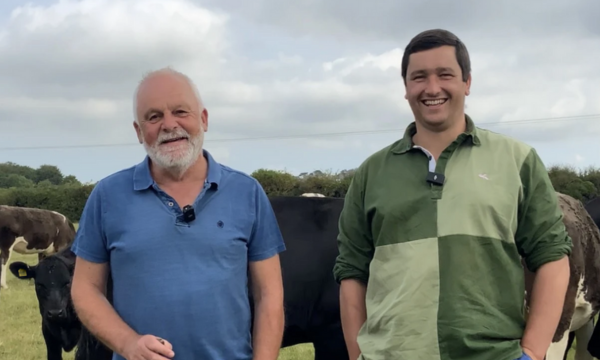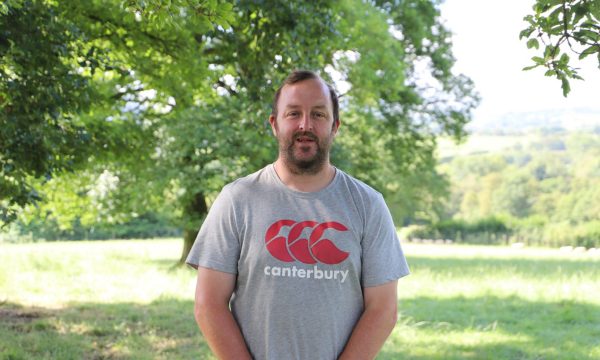Farmers and growers trialling different farming techniques and innovations as participants in the Farming Connect Our Farms network are hosting events in September when other farmers will learn what they have discovered from projects ranging from targeted selective treatment for sheep to intercropping maize.
For the second year, Farming Connect will hold a series of ‘Visit Our Farms’ events in September on its network of beef, sheep and dairy holdings and at businesses producing vegetables, fruit and flowers for the horticulture sector.
Last year there were 15 of these knowledge exchange events but they proved so popular with the industry that 2025 sees that number increased to 22.
Each provides opportunities for other farmers and growers to gain valuable insights into trials and projects that have concluded or are ongoing.
In Pembrokeshire, at Parc y Dderwen, Llangolman, where Lauren Simpson and Phil Moore run a number of a horticulture enterprises on their 5ha holding, visitors will see first-hand the progress being made on their Our Farms project work on growing edible and herbal perennial crops to supply new markets.
They also grow crops for commercial seed saving to supply Welsh businesses, Real Seeds and the Welsh Seed Hub.
At the event at Parc y Dderwen, topics for discussion will include Lauren and Phil’s diversification into perennial horticulture crops, how they utilise commercial seed saving and produce brassicas for their commercial fermented food business.
Lauren says it promises to provide other growers with lots of opportunities to learn how to enhance both the income and biodiversity potential of their own businesses.
One aspect of the enterprise is to add value, she points out, with a processing kitchen on site, an example of how primary producers can generate additional income or make what they grow last for longer.
The business is also a good example of how a viable business can be created from a relatively small growing area, Lauren adds.
“We have also got lots of wildlife areas so growers will be able to see how they can integrate biodiversity alongside growing,’’ she says.
Speakers will include agroforestry specialist Tom Clare, Kate McEvoy, of Real Seeds, and Geraint Jones, Forestry Specialist Officer at Farming Connect.
They will share detailed information on perennial crop management, on generating an income from seed saving, and advise how trees can be used to enhance perennial horticulture to grow a business.
The value of this event and others in this series of farm walks was summed up by people who attended last year's programme, with 99% of attendees stating that they had learnt something new and 93% planning to make changes to their business following the events.
Farming Connect Horticulture Sector Officer Hannah Norman says the event at Parc y Dderwen is an opportunity for farmers and growers to explore the fundamentals of longer-term crop cycles, primarily considerations for perennial crop production, seed saving and integrating trees into horticulture systems.
“The trial at Parc y Dderwen has been looking at the establishment of different perennial crops and how to manage soil health, weeds, pests and disease for plants not in rotation,’’ says Hannah, who has been overseeing the project work.
“Joining us in September is a great line up of technical experts and we look forward to sharing the lessons learnt so far.”
The event will take place on 8 September from 4pm – 7pm. Refreshments will be provided therefore visitors are advised to book a place in advance of the event.
In Powys, farmers will see first-hand the measures Roger and Dyddanwy Pugh have put in place to maximise feed efficiency and daily liveweight gains, to improve their business for the future.
Together, Roger and Dyddanwy run a spring calving herd of 60 Limousin and Aberdeen Angus cross suckler cows along with a flock of 300 Texel cross ewes.
Topics for discussion will include working out the real cost of iceberg diseases in sheep and liver fluke risk mapping your farm – and the impact of biological products on grass quality and yield.
Roger says soil health is important to every farming business therefore there is great value in learning more about which products may be beneficial in improving forage quality, mitigating abiotic stress, and supporting crop yields while decreasing reliance on chemical inputs.
“There are so many products on the market and there is a lot of talk about how amazing they are so we were really keen to gain knowledge on whether they actually do work,’’ he says.
“They can be very costly but if they can improve our soil and the productivity of our land they might save us money in the long term.’’
Speakers will include Dr Rhys Aled Jones of Aberystwyth University, Dr Peers Davies, of the University of Liverpool, Dr Non Williams, of Farming Connect, and Hugo Ellis, of Terrafarmer.
Technologies related to the project work at Crickie Farm will be demonstrated on various stalls at the event.
Farming Connect sector officer Lynwen Mathias, who is overseeing the project work at Crickie, says this event and others offer an excellent opportunity for farmers to see a diversity of projects in action on commercial farms.
“If a farmer is considering implementing similar practices, the events are a chance to see the projects for themselves,’’ she says.
“Or it may be that by coming along to an event like this, farmers might learn more about ideas that they might not have thought of but which offer an opportunity to make their own businesses more resilient.’’
The event at Crickie will take place on 15 September from 4pm – 7pm. Refreshments will be provided therefore visitors are advised to book a place in advance of the event.
In Montgomeryshire, farmers will see first-hand how the Griffiths family are growing drought-tolerant multi-species leys at Cilthrew, their beef and sheep farm at Llansantffraid ym Mechain.
Through their involvement in Our Farms, Marc, Wynn and Bethan Griffiths are trialling different techniques to put their 120ha farming business in a strong position to adapt to the upcoming changes in agricultural policy, to ensure it is sustainable and prosperous.
Marc, the third generation of his family to farm at Cilthrew, says the drought-tolerant pasture has been put to the test in a summer characterised by long spells of very dry conditions.
He is looking forward to discussing the results further with farmers attending the event.
“In my experience, as a farmer you learn as much from others coming to the farm. That can come in part from being challenged on different aspects of how we do things,’’ he reckons.
Topics for discussion will include utilising nitrogen (N) use efficiency to optimise yields in crops of fodder beet, and the impact of biological products such as seaweed and molasses that have been applied on the farm and their impact on grass quality and yield.
“We farm in a high magnesium area and that can make the soil tight so there could be a value in these products in opening up the soil without mechanical interventions,’’ says Marc.
At Cilthrew, the farming policy is centred on efficiency and producing as much feed, as possible on-farm, including protein.
Farming Connect sector officer Owain Pugh, who is overseeing the project work at the farm, says there will be much that farmers will learn from attending the event and an opportunity to see how some of the latest technology is being utilised at Cilthrew, including moisture and nutrient sensors in the fodder beet crop.
These sensors have helped to inform the crop’s N needs and when the product should be applied; by having them in place, the Griffiths’ had used less N than scheduled in the application plan, says Owain.
There will be a chance to see how the fodder beet has performed with a foliar application of N compared to a prilled product.
“We also hope to have a drone there on the day demonstrating how foliar feed can be applied above the crop to prevent the plants from getting crushed,’’ says Owain.
The event at Cilthrew will take place on 16 September from 4pm – 7pm. Refreshments will be provided therefore visitors are advised to book a place in advance of the event.
In Flintshire, farmers will see first-hand how Rhys Davies and his parents, Dei and Heulwen, are managing their 85ha farm to cope with a changing climate and how they are increasing outputs without increasing inputs, and also using technology driven by artificial intelligence (AI) within their business.
The family produces milk from a spring calving herd of 120 Holstein Friesians producing an annual average milk yield of 7,500 litre /cow at 4.6% butterfat and 3.67% protein.
At the event, topics for discussion will include whether pre-mowing is a cost-effective tool to maintain pasture quality in a rotational grazing system, and farmer Dai Evershed will advise on how farmers can utilise LoRaWAN technology to manage water supply for their livestock.
Rhys says he is looking forward to learning more about pre-mowing from IBERS lecturer Cennydd Jones, a speaker at the event, and grassland management in general.
Rhys has been trialling pre-mowing as an alternative to baling leys on the grazing platform to extend the rotation in a dry spell and encourage cows to clean up fields, and comparing the performance of those paddocks to others that are grazed.
“Pre-mowing does seem to help with the utilisation of every last blade of grass so there are no rejections,’’ he says.
Attendees will also hear findings from the Farming Connect Welsh Pasture project and UK Government funded project, Nitrogen Use Efficiency (NUE-Leg), led by industry and IBERS, he adds.
The diversity of farmland birds at Moor Farm will also be discussed – recording devices monitoring birdsong were set up on the farm and these showed a significant number of different species, many on the ‘watch list’ of endangered birds.
Technologies related to the project work at Moor Farm will be demonstrated on various stalls at the event.
Farming Connect sector officer Osian Hughes, who is overseeing the project work at Moor Farm, says the event offers an opportunity to network with like-minded people and industry stakeholders.
“We are looking forward to welcoming farmers to our event to share findings and showcase the project work that's been going on at Moor Farm over the last two and a half years,’’ he says.
“It will be a great opportunity to learn and discuss common challenges facing the industry and see what technologies and best practices are out there to meet these challenges.’’
The event at Moor Farm will take place on 18 September from 11am – 2pm. Refreshments will be provided therefore visitors are advised to book a place in advance of the event.
For a full list of the farm walks across Wales visit: https://businesswales.gov.wales/farmingconnect/whats-on












